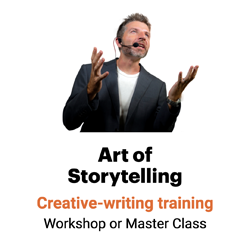Start your story in medias res
You remember learning about in medias res (classical Latin for “into the middle things”) in college. That’s where you open your story the midst of the action.

[Don’t bother with background, scene setting or even introducing the subject. Just start at the most dramatic moment of the current problem. Let’s call this moment “yesterday.”] “I’m getting another earache,” the 39-year-old man told his wife one summer afternoon. [Now you can back up and give more context. Notice we’re moving back in time here, to a previous experience he’d had last winter. This section gives the background on the case.] He had never had an earache, even as a kid, until the previous winter, when he developed a sudden, intense pain like a knife stabbed into his head: precise, excruciating, unrelenting. The doctor at a local urgent-care center told him he had an infection and gave him antibiotics. And after a day or two, the pain just melted away.
[Here, we move through the period between summer and winter with one phrase.] He hadn’t thought about that episode since, [And now we’re back to the short period before the earache that we opened at.] until he noticed the pressure on the right side of his head that [And we’ve arrived back at yesterday.] turned into this second earache. It was the same ear but a different pain.
[More details about the current problem, yesterday …] His eye looked a little puffy too, his wife told him. He had just mowed the grass, he told her. Maybe it was his allergies.
[And now we arrive at today. More details about the current problem … ] But that night the pain worsened. Glancing into the mirror, the man noticed something new: One pupil, on the side of the painful ear, was a little smaller than the other. In the morning light, the next day, his eyes looked better. But the ear- ache throbbed on.
[One of my clients, who is head of communications at a large health care system, tells his writers to “get the patient to the hospital!” But notice how taking the time to detail the problem helps engage readers and makes your doctors seem even more brilliant for solving this huge problem.] He returned to the urgent-care center. Again he was told he had an infection, again given antibiotics. When he felt no better the following day, he called his newly assigned doctor, Robert Kavaler, in Paramus, N.J., who squeezed him in for an exam.
Some things to steal from this piece:
- Literally start at the beginning: “I’m getting another earache.”
- Masterfully interweave time elements at the top to engage the reader while delivering a lot of background and not losing track of the story.
- Detail the problem before introducing the solution. This takes a great deal of control when the solution is “us and our stuff,” or the products and services that you’re promoting through the piece.
How can you use in medias res to kick-start your story?

Leave a Reply